Mike Batt Talks About His Collaboration With Katie Melua

Mike Batt is one of Britain’s best-known songwriter/composers. His consistent track record of success includes production, composition and conducting on projects as diverse as WATERSHIP DOWN (music and lyrics to Art Garfunkel’s international number one single, Bright Eyes), PHANTOM OF THE OPERA (producing, co-writing with Andrew Lloyd Webber and orchestrating the first hit) and a great deal of symphonic work, including many television and film scores. And you who can forget the hit machine called the Wombles of Wimbledon, another Batt creation.

Batt is the only composer ever to have won the Ivor Novello Award for Best Film Music two years in succession, once with WATERSHIP DOWN and once with CARAVANS the epic adaptation of Michener’s novel, starring Anthony Quinn.
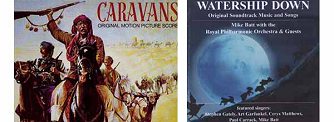
He has conducted some of the world’s great orchestras and worked with many artists including Vanessa Mae (as composer and producer on the four million-selling debut album THE VIOLIN PLAYER), David Essex, Elkie Brooks, Steeley Span, and Cliff Richard.
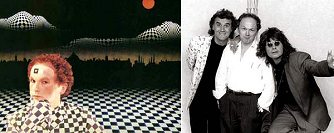
After conceiving and co-creating the all-girl string quartet Bond, and producing their first single. Batt then created the eight-piece classical crossover band The Planets whose debut album, CLASSICAL GRAFFITI, was released in February 2002 and went straight to number one (classical charts) on the day of release, and remained there for three months.
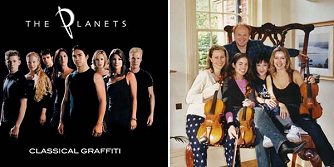
Singer/songwriter Katie Melua represents his most recent collaboration and her debut album, CALL OFF THE SEARCH, has sold over 100,000 copies, while the first single, The Closest Thing To Crazy, has recently entered the top 20 of the UK singles chart. I wanted to know more about his work with Katie…
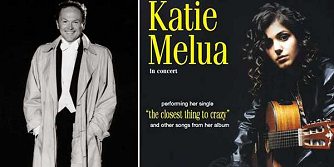
You’ve had a fascinating and largely successful career in a business famed for its ‘hits’ and ‘misses.’ What are the prime ingredients in your artistic, creative and commercial makeup that have contributed to this level of consistency?
It’s a myth that a person can retire on one hit record, perhaps it has happened in the history of the music business, but it is extremely rare. The percentage (8%) of the cover price of a record which has to be shared by often two or more writers with their publisher, and then split between several songs on a single, makes it almost impossible to make serious money from just one hit, unless it goes global and one writes all the songs on the record and has an interest in the artist. Because of this, it is essential to achieve consistency, and yet consistency is at odds with the very nature of the business. One can only strive to keep the quality of the work as high as possible, and develop an agile business sense to allow as much tolerance as possible, of the inevitable failures that will come along at least as often as the successes.
It seems to me that there is a strong level of ‘accessibility’ in what you create (regardless of genre). What are you fundamental beliefs; rules of engagement; in creating music for others to enjoy? And what major influences can you identify…
‘Rules of engagement’ is a good way of expressing it. In my case, I think those rules involve sincerity; giving the lyrics of a song high priority; because a song that means something to me will mean something to someone else. If I am producing an artist or writing for them it is essential to remember that it is they who must be reflected in the spotlight, and not me particularly. Melody lines can be crafted to suit a particular voice, just as subject matter and the means of lyrical expression can be tailored to suit the personality of an artist. Having said that, I find that most of my material does have an undeniable identity as mine, but that must just be a natural thing. Major influences are many and varied, from classical music, old songs, Paul Simon, the Beatles and all of the acts which were around when I was in my formative years, i.e. Lovin’ Spoonful, Stones, the Who etc..
You appear to be an innovator with a strong hint of pragmatism. Could you comment on this?
I first read this question as containing the phrase “strong hint of plagiarism”, but I am glad I misread it! Pragmatism? Yes I suppose so. I think most of my writing and production ignores fashion trends, but in order for me to enjoy this luxury, I have to have a keen eye on the market and the available opportunities within it.
It also seems to me that Katie Melua represents a fresh direction for you. What is the background to this collaboration, and your prime reasons for working with Katie?
Almost every artist I work with represents a fresh direction, or should do (although most of my songs on the album were written before I met Katie). But the background to the collaboration is the fact that I was looking for a young artist to make such an album, and when I found Katie at the Brit School in Croydon, where she was studying, I realised just how unique she was.
How did you approach the song writing aspect of your work with Katie?
We started this project with the idea that Katie would write much of the album, co-write some of it with me, and that I would contribute a couple of songs. We spent a long time fiddling with that balance, and it was when we discovered what an extraordinary singer Katie is in her own right (quite apart from her writing ability) it became obvious that she should have a wide range of material available to her to interpret purely as a singer. It was then that I looked at my larger catalogue of songs, particularly for any songs that I felt were of high enough quality but which I had never used on such a project. Katie is developing strongly as a writer, which should be interesting for future albums.
**page*
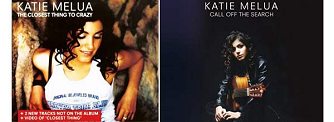
Recent examples of other young and talented singers are Delta Goodrem and Alex Parks. In both cases my view is that mega-budget production/arrangements have come close to masking good songs and strong vocal performances. With Katie, this is not the case and I imagine was something of a challenge. Could you describe how you arrived at such a wonderful compromise? And the challenges represented by Katie’s voice (which seems very powerful)?
It seemed evident from the beginning that Katie’s voice and her imaginative use of it was what would make this album successful, and that my job was just to keep out of the way and let it happen. She and I would discuss a vocal, and in some cases we would do several performances with me making suggestions as to vocal phrasing etc. Some of the takes however were one-take situations with the band playing live here in the studio. For example, Learnin’ The Blues was performed without discussion, just as a guide vocal, but was such a brilliant take that we just kept the guide vocal on the final record. What did take a lot of thought, and developed during the entire year was our joint decision to slip into this laid back jazz based groove, and we did establish rules, for example, no open snare drum hits. The loudest we get on the drums is a snare drum side stick, but it is mostly brushes. It is not so much that Katie’s voice is powerful, but her use of it…
In working with Katie, did you establish ‘reference points’ by listening to other artist recordings and if so, which?
No, we didn’t.
‘The Closest Thing To Crazy’ is the song that alerted me to Katie as I hadn’t received the album to review. I suspect that it will perform the same ‘trick’ for other listeners. What was your objective(s) with this particular song?
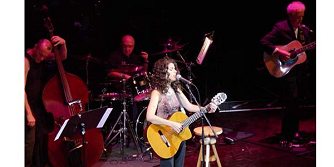
There were no objectives in mind when I wrote the song, it was just a strong feeling that made me write it. In picking it as a single, my objective was to focus people’s attention on a single song rather than the broader album. We chose the song because of the incredible reaction Terry Wogan got when he first played the record on BBC Radio 2.
I suspect that working with Katie and the ‘hasten almost slowly’ strategy is something that provides very special personal satisfaction for you. Could you comment on this, and especially in achieving this in a UK pop music market that is arguably at its most ‘manufactured’ and meaningless…
The thing which allowed me to take this last year at a relaxed pace was the knowledge that Katie would be successful whatever happened, even if I screwed up. It was just a question of what level that success could be on, and it was made easier by the fact that Katie is not thrusting and ambitious on a fame or money scale. She just wants to play and to be appreciated.
You chose a particular (and wonderful) route for the instrumental support for Katie. Could you comment on this….
Some of this is answered above, but to add to it, I would say that the most enjoyable way of recording was also the most successful. The studio is in my house, or I should say, is my house. We set Henry Spinetti up with his drums in the hall, Katie goes into the cloakroom to sing, and I sit at the piano in the drawing room with Tim Harries on bass and Jim Cregan or Chris Spedding on guitar. We just play the songs and it is a fantastically relaxed and satisfying way of working.
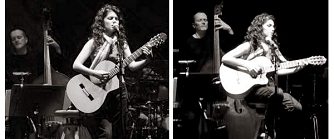
Batt and Melua are a formidable and potentially world-beating combination. What are your plans for overseas markets and in particular the USA?
We are currently discussing this matter with all the major record labels, who have approached us and would like to sign Katie outside the UK. We will retain some territories to work independently. We expect a co-ordinated release across Europe in March and probably the States shortly thereafter.
Can you explain the thinking behind the Romantico label and your plans for it…
Dramatico was formed a couple of years ago and is purely a vehicle for my own work. I would like to keep it that way rather than expanding it.
In choosing other artists to work with for the new label, what aspects in their makeup are key in any selection process? And what reasons would you give in why artists consider working with you?
I would really like to keep my activities limited to projects which strongly interest me artistically, and Dramatico exists in order to enable me to do that without compromising myself too much by being obliged to be supervised by major record company A&R staff.
Thanks Mike
|
|

|

Depeche Mode |
LATEST GALLERY IMAGES
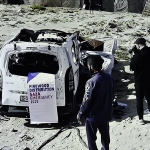
Charity Workers Massacred 
We Bombed A Hospital |
|
|

